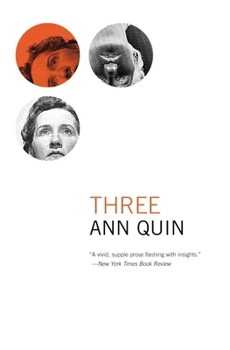Three
Select Format
Select Condition 
Book Overview
This enigmatic novel, from one of Britain's most important writers of the post-war avant-garde, explores suicide, marriage and class.
S has disappeared from Ruth and Leonard's home in Brighton. Suicide is suspected. The couple, who had been spying on their young lodger since before the trouble, begin to pour over her diary, her audio recordings and her movies - only to discover that she had been spying on them with even greater intensity. As this disturbing, highly charged act of reciprocal voyeurism comes to light, and as the couple's fascination with S comes to dominate their already flawed marriage, what emerges is an unnerving and absorbing portrait of the taboos, emotional and sexual, that broke behind the closed doors of 1950s British life.
S has disappeared from Ruth and Leonard's home in Brighton. Suicide is suspected. The couple, who had been spying on their young lodger since before the trouble, begin to pour over her diary, her audio recordings and her movies - only to discover that she had been spying on them with even greater intensity. As this disturbing, highly charged act of reciprocal voyeurism comes to light, and as the couple's fascination with S comes to dominate their already flawed marriage, what emerges is an unnerving and absorbing portrait of the taboos, emotional and sexual, that broke behind the closed doors of 1950s British life.
Format:Paperback
Language:English
ISBN:1564782727
ISBN13:9781564782724
Release Date:December 2005
Publisher:Dalkey Archive Press
Length:143 Pages
Weight:0.45 lbs.
Dimensions:0.4" x 5.5" x 8.3"
Grade Range:Postsecondary and higher
Customer Reviews
1 rating
Ann Quin's Best?
Published by Thriftbooks.com User , 19 years ago
A bickering middle-aged bourgeois couple go through the belongings of their lodger, a young woman, who has apparently committed suicide. They listen to her tapes and read her diaries, most of which consist of her observations of their lives. Aspects of the psycho-sexual relations between the three characters emerge from different standpoints. In typical 1960s style Ann Quin's four novels gets progressively more experimental. The first "Berg" is still in conventional modernist territory, with overwrought mythical subtexts & symbolism, while her third & fourth novels got increasingly lost in formal "postmodern" experimentation. But in her second book, "Three" she gets it just about right. Maybe there's still some Pinter/Beckett-type influence, but Quin definitely finds an original voice. The narrative switches back and forth between characters & the tapes/diaries, thus different perspectives & versions of episodes accumulate, going back & forth in time. As with her friend/rival B.S.Johnson, Quin's idiosyncrasy lies in combining these "nouveau roman" techniques with a very English tragi-comedy of social manners ( & as with Johnson there also is an explicit sense of suicidal hysteria informing the writing). However Quin's writing has a highly charged visionary, sensual & lyrical quality not found in Johnson. If Johnson was trying to capture reality, Quin was trying to capture the reality of fantasy. All these elements make "Three" an uneven but fascinating and moving novel, which has ceased to be a period piece and once again come to life. Note: These excellent (American) Dalkey Archive reprints of Quin's novels are good quality, well-produced editions.






